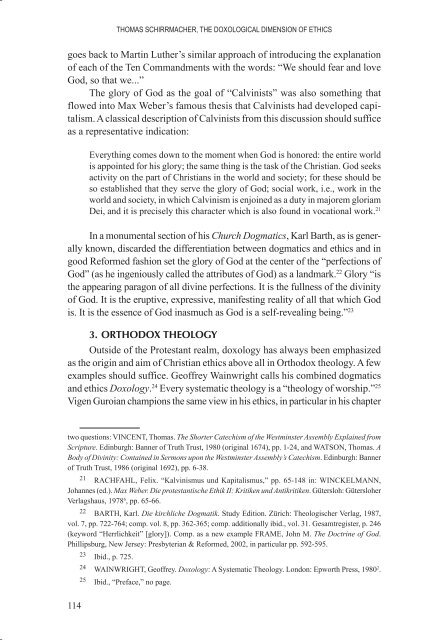Fides 20 N2 - Revista do Centro Presbiteriano Andrew Jumper
Revista Fides Reformata 20 N2 (2015)
Revista Fides Reformata 20 N2 (2015)
You also want an ePaper? Increase the reach of your titles
YUMPU automatically turns print PDFs into web optimized ePapers that Google loves.
Thomas Schirrmacher, The <strong>do</strong>xological Dimension of Ethics<br />
goes back to Martin Luther’s similar approach of introducing the explanation<br />
of each of the Ten Commandments with the words: “We should fear and love<br />
God, so that we...”<br />
The glory of God as the goal of “Calvinists” was also something that<br />
flowed into Max Weber’s famous thesis that Calvinists had developed capitalism.<br />
A classical description of Calvinists from this discussion should suffice<br />
as a representative indication:<br />
Everything comes <strong>do</strong>wn to the moment when God is honored: the entire world<br />
is appointed for his glory; the same thing is the task of the Christian. God seeks<br />
activity on the part of Christians in the world and society; for these should be<br />
so established that they serve the glory of God; social work, i.e., work in the<br />
world and society, in which Calvinism is enjoined as a duty in majorem gloriam<br />
Dei, and it is precisely this character which is also found in vocational work. 21<br />
In a monumental section of his Church Dogmatics, Karl Barth, as is generally<br />
known, discarded the differentiation between <strong>do</strong>gmatics and ethics and in<br />
good Reformed fashion set the glory of God at the center of the “perfections of<br />
God” (as he ingeniously called the attributes of God) as a landmark. 22 Glory “is<br />
the appearing paragon of all divine perfections. It is the fullness of the divinity<br />
of God. It is the eruptive, expressive, manifesting reality of all that which God<br />
is. It is the essence of God inasmuch as God is a self-revealing being.” 23<br />
3. ortho<strong>do</strong>x theology<br />
Outside of the Protestant realm, <strong>do</strong>xology has always been emphasized<br />
as the origin and aim of Christian ethics above all in Ortho<strong>do</strong>x theology. A few<br />
examples should suffice. Geoffrey Wainwright calls his combined <strong>do</strong>gmatics<br />
and ethics Doxology. 24 Every systematic theology is a “theology of worship.” 25<br />
Vigen Guroian champions the same view in his ethics, in particular in his chapter<br />
two questions: VINCENT, Thomas. The Shorter Catechism of the Westminster Assembly Explained from<br />
Scripture. Edinburgh: Banner of Truth Trust, 1980 (original 1674), pp. 1-24, and WATSON, Thomas. A<br />
Body of Divinity: Contained in Sermons upon the Westminster Assembly’s Catechism. Edinburgh: Banner<br />
of Truth Trust, 1986 (original 1692), pp. 6-38.<br />
21 RACHFAHL, Felix. “Kalvinismus und Kapitalismus,” pp. 65-148 in: WINCKELMANN,<br />
Johannes (ed.). Max Weber. Die protestantische Ethik II: Kritiken und Antikritiken. Gütersloh: Gütersloher<br />
Verlagshaus, 1978 6 , pp. 65-66.<br />
22 BARTH, Karl. Die kirchliche Dogmatik. Study Edition. Zürich: Theologischer Verlag, 1987,<br />
vol. 7, pp. 722-764; comp. vol. 8, pp. 362-365; comp. additionally ibid., vol. 31. Gesamtregister, p. 246<br />
(keyword “Herrlichkeit” [glory]). Comp. as a new example FRAME, John M. The Doctrine of God.<br />
Phillipsburg, New Jersey: Presbyte rian & Reformed, <strong>20</strong>02, in particular pp. 592-595.<br />
23 Ibid., p. 725.<br />
24 WAINWRIGHT, Geoffrey. Doxology: A Systematic Theology. Lon<strong>do</strong>n: Epworth Press, 1980 2 .<br />
25 Ibid., “Preface,” no page.<br />
114

















